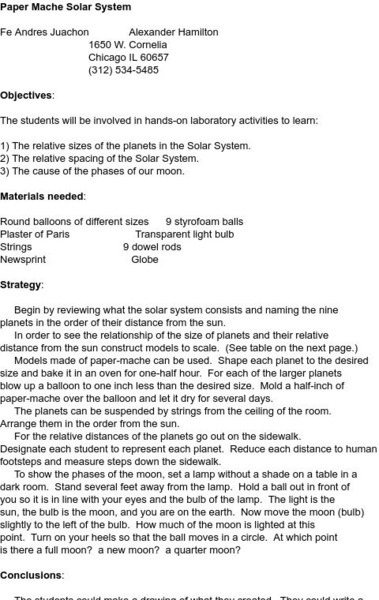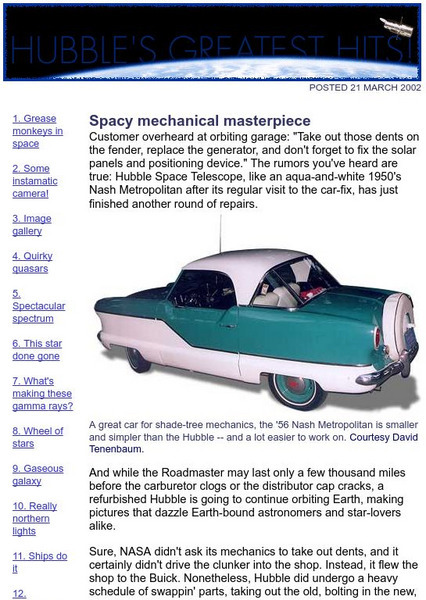CK-12 Foundation
Ck 12: Earth Science: Satellites, Shuttles, and Space Stations Study Guide
[Free Registration/Login may be required to access all resource tools.] This study guide provides a brief overview of satellites, shuttles, rockets, and space stations. Includes a few questions to check for understanding.
Library of Congress
Loc: America's Story: Johnson's Task, Unify Space Program
Russia was ahead in the "space race" in 1961. In this article, the Library of Congress discusses how President Kennedy assigned Lyndon Johnson the task of uniting the different parts of the U.S. space program into NASA.
NASA
Nasa: Kepler's Third Law
This site from NASA states Kepler's third law of motion and extends it to develop an equation for the velocity of an orbiting planet.
NASA
Nasa: Kepler's Second Law
This site from NASA states Kepler's second law of planetary motion and depicts its meaning with an informative diagram. Relates the law to conservation of energy principles and discusses the eccentricity of a satellite's (or a planet's)...
Exploratorium
Exploratorium: Third From the Sun
This site offers a short history of the evolution of the space program and man's quest for more revealing and detailed pictures of the earth.
Cosmo Learning
Cosmo Learning: Astrobiology and Space Exploration
A collection of video lectures from several guest speakers about issues of astrobiology and space exploration at Stanford University. The lectures cover topics like Martian meteorites, planetary system, life in space, and satellites....
Science and Mathematics Initiative for Learning Enhancement (SMILE)
Smile: Paper Mache Solar System
This site from the Illinois Institute of Technology provides a set of directions for the creation of a solar system model out of paper mache. Includes orbital distances and planet diameters for the nine planets. Great idea for a student...
University of Wisconsin
The Why Files: Spacy Mechanical Masterpiece
An interesting article describing repairs which were completed on the Hubble telescope in 1993 and 1997. Also contains links to pictures taken by the telescope.
Trinity College Dublin
The History of Mathematics: Roemer
A short biographical sketch of the life and work of Ole Roemer (1652-1719 CE). Identifies his scientific discoveries and contributions in astronomy.
PBS
Pbs Teachers: Comparing Satellite and Broadcast Radio Landscapes (Lesson Plan)
A lesson in which students research the development of satellite technology and how it has evolved over the last 50 years. Students will examine the impact of the Telecommunications Act of 1996 and discuss the role of a diverse, free...
NASA
Nasa: Imagine the Universe: Gamma Ray Astronomy Satellites and Missions
"We present the many satellites which have detected electromagnetic radiation through the 1960s, 70s, 80s, and 90s." Visit this site to read more about the development of satellites throughout the history of gamma-ray astronomy. Graphics...
University of St. Andrews (UK)
University of St. Andrews: Orbits and Gravitation
A page describing the physics, mathematics, and historical figures associated with planetary motion, satellite motion, and universal gravitation.
Georgia State University
Georgia State University: Hyper Physics: Global Positioning Satellites
The physics associated with global positioning satellites is discussed. The mechanism by which they triangulate the location of an object is described.
NASA
Nasa: Imagine the Universe: Welcome to the World of Multiwavelength Astronomy!
This Imagine the Universe site provides an introduction into the multiwavelength universe and astronomy. Site provides graphics, links to a quiz, facts on this topic as well as teacher resources.












